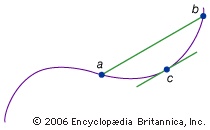mean-value theorem
mathematics
theorem in mathematical analysis dealing with a type of average useful for approximations and for establishing other theorems, such as the fundamental theorem of calculus (analysis).
 The theorem states that the slope of a line connecting any two points on a “smooth” curve is the same as the slope of some line tangent to the curve at a point between the two points. In other words, at some point the slope of the curve must equal its average slope (see figure-->
The theorem states that the slope of a line connecting any two points on a “smooth” curve is the same as the slope of some line tangent to the curve at a point between the two points. In other words, at some point the slope of the curve must equal its average slope (see figure--> ). In symbols, if the function f(x) represents the curve, a and b the two endpoints, and c the point between, then 【f(b)−f(a)】/(b−a)=f′(c), in which f′(c) represents the slope of the tangent line at c, as given by the derivative.
). In symbols, if the function f(x) represents the curve, a and b the two endpoints, and c the point between, then 【f(b)−f(a)】/(b−a)=f′(c), in which f′(c) represents the slope of the tangent line at c, as given by the derivative.Although the mean-value theorem seemed obvious geometrically, proving the result without appeal to diagrams involved a deep examination of the properties of real numbers (real number) and continuous functions (continuity). Other mean-value theorems can be obtained from this basic one by letting f(x) be some special function.
- Strait of Messina
- Straits of Florida
- Straits of Mackinac
- Straits Question
- Straits Settlements
- Straits Times, The
- Stralsund
- strambotto
- Strand, Mark
- Strand, Paul
- strange particle
- Strangford Lough
- Strangford Treaty
- Strang, Gunnar Georg Emanuel
- Strang, James Jesse
- strangler fig
- strangles
- Stranitzky, Joseph Anton
- Straparola, Gianfrancesco
- strapwork
- Strasberg, Lee
- Strasbourg
- Strasbourg I, II, and III, Universities of
- Strasbourg ware
- Strasburger, Eduard Adolf